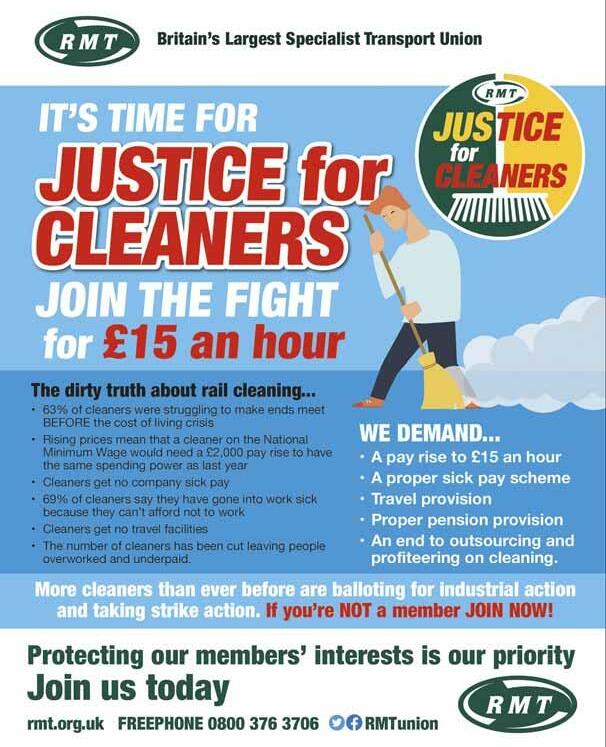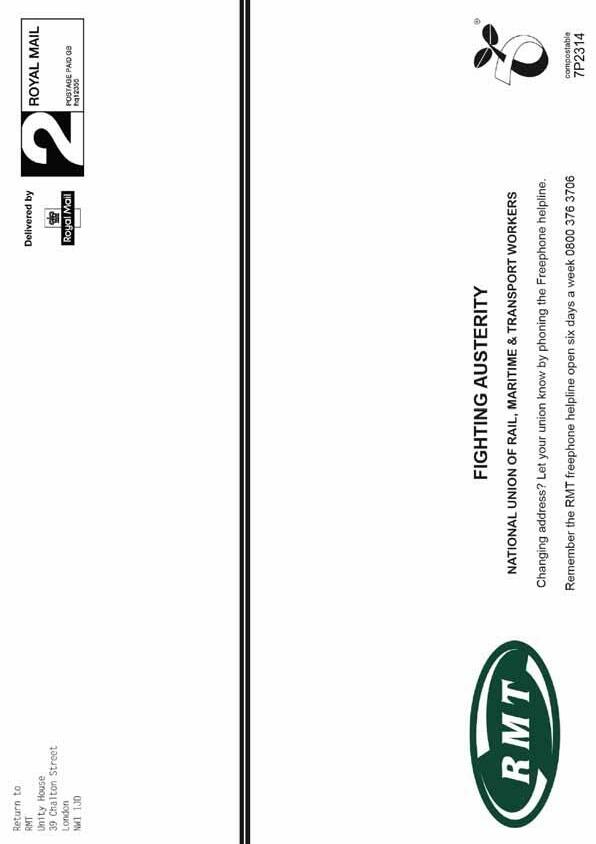




















RMT membership helps you at work and saves you money
RMT has developed a number of benefits to save members money. This includes negotiating access to savings and special offers from our approved partners.
The union has a dedicated team of elected officers and local reps to serve your interests negotiating with employers on issues from pay, hours of work, pensions and working conditions. They are supported by a team of researchers to formulate pay claims to obtain the best negotiated terms for you.
The union has a political fund to run campaigns and provide a political voice to benefit members’ interests in the workplace. RMT has a very active parliamentary group which raises issues of concern for members at Westminster, the Scottish Parliament and Welsh Assembly.
Personal injury claims cover if you suffer an accident in work or outside work. RMT underwrites settlements that would not be provided by no-win, no-fee companies. Call 08457 125 495.
Members who have suffered an industrial disease will receive free legal support to make a claim. Such claims are underwritten by the union and members will not have any deduction from their settlement unlike claims run by no-win, no-fee companies. Call 08457 125 495
Should a member find themselves unfairly
dismissed, discriminated against or have any claim which has reasonable prospects of success at an Employment Tribunal, RMT will provide legal representation and pay the fee. Even if the union is advised that the claim is unlikely to succeed, members who make a claim are eligible to receive free legal advice.
Payable if you have an accident at work or on the way to or from work. Accident benefit is only payable if you have been off for three days or more. Accident must be reported to branch secretary within 26 weeks in order to qualify for accident benefit.
Payable to any member who retires over the age of 60 or aged 55 if retired through redundancy or resettlement. Ill health retirement is also payable; proof of this must be sent with application for retirement benefit.
The union can provide a personal taxation service and will preparation service.
Payable to any member who is experiencing loss of wages through being permanently demoted or downgraded as a result of illness or injury.
Payment of £300 provided that member reports this to branch secretary within 12 weeks.
The beneficiaries of this fund would be any child of a member or spouse if the member dies in service or if a members’ spouse dies and the member has responsibility of the children. Benefit is paid while a child is in full-time education up until the age of 22. Payment is made quarterly and the rate is £12.00 per week for children up to the age of 16, then £12.75 per week from 16 to 22.
Accessible savings and affordable loans from RMT’s Credit union. www.rmt.org.uk/about/credit -union
Shop online with RMTrewards.com and earn cashback savings from hundreds of retailers, like B&Q, Argos and Tesco. It’s free to join, plus you’ll get a FREE £10 Welcome Bonus in your online account! (Terms and conditions apply) www.rmtrewards.com
FINES POOL
if you drive a company vehicle as part of your job you can join the RMT fines pool for £7 per year. The Fines Pool will reimburse members for any speeding fines, related court costs and lost time to attend a court hearing. www.rmt.org.uk/memberbenefits/fines-pool
A Death Grant of £600 is payable to the nearest relative or legal representative if a member dies through any cause prior to retirement.
Fancy cashback on your everyday shopping? Use your RMT Prepaid Plus Cashback card at over 50 partner retailers, including Sainsbury’s, ASDA and Boots, and earn unlimited cashback! It’s different to a credit or debit card - you can only spend what you load so there’s less chance of getting carried away. www.rmtprepaid.com
As a benefit of your RMT membership you can register for £5,000 Free Accidental Death Cover. Cover is for UK residents aged 18-69. 12 months free cover. Annually renewable and always FREE. The Cover is underwritten by Advent Insurance PCC Ltd – UIB Cell. www.rmtprotect.com
For a small monthly premium you can claim cash-back on dental, optical and therapy treatments. Visit www.bhsf.co.uk
Join RMT by visiting www.rmt.org.uk
Thisunelected government has frozen industrial relations on the railways by interfering in talks with the train operating companies and Network Rail and preventing any resolution to these longrunning disputes despite the fact that it has no mandate to do so.
This union has won pay settlements in Scotland and Wales and other areas yet the government in Westminster seems determined to block any meaningful progress towards a settlement.
The union suspended previous strike action in good faith to allow for intensive negotiations to resolve the dispute. Yet, Network Rail has failed to make an improved offer on jobs, pay and conditions despite a massive rejection of its current offer in the latest referendum.
At the same time the Rail Delivery Group, representing the train operating companies, has broken a promise to make a meaningful offer on pay and conditions and even cancelled negotiations at the last minute.
At the Transport Select Committee last month Transport Secretary Harper flatly refused to deny government interference after the demand for driver-only operations was inserted into any pay deal.

Ben Bradshaw MP told the minster directly that “train operators and the unions both say that this issue has been inserted in the last week by No 10 or the Treasury, which has scuppered a deal” but Harper refused to respond.
This government needs to stop meddling and avoiding questions in order to allow normal industrial relations to re-commence so we can get the railways back on track.
Contracted out cleaners are also taking national strike action for the first time as part of a national campaign demanding £15 an hour, company sick pay, decent holidays and good pensions from contractors - some of whom are raking in profits of over £100 million a year.
As you will see in this issue of the magazine these companies are raking in millions of pounds worth of profit, and it is high time they handed over a chunk of that money to their hard-working staff rather than rewarding greedy shareholders.
Working class people need a pay rise and we are determined to win that for RMT members.
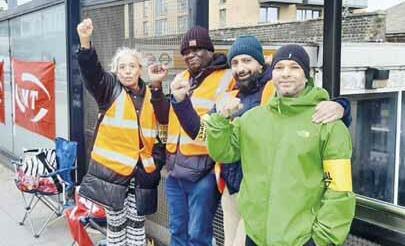
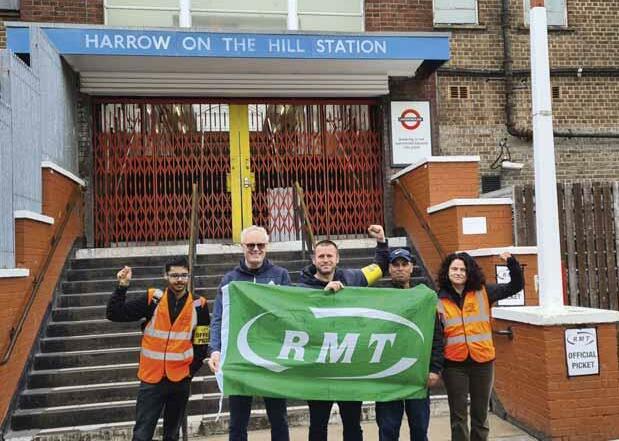
Strikes on London Underground went ahead in November after Transport for London refused to reach a compromise that would have suspended the action.
Arriva Rail London members also took action after management refused to increase its low offer for 2022 despite the fact that ARL paid a dividend of £7.2 million to its shareholders and aims to pay another premium of £7.7 million, making a total of nearly £15 million in dividends. This is despite the fact that deals had been agreed on London Underground and MTR Elizabeth Line.
The union had also asked

TfL to pause job cuts and detrimental pension changes on the Tube to give both sides the space to come to a negotiated settlement.
RMT proposed that TfL suspended the implementation of 600 station job cuts until the end of this year and not agree to detrimental attacks on tube workers' pensions arising out the current pension review that it is conducting with the government.
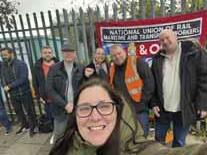
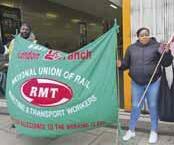

However, tube bosses said that they would press ahead with the plans, meaning that LU staff had no choice but to go ahead with strike action.
RMT general secretary Mick Lynch said that TfL had missed a golden opportunity to make progress in negotiations and avoid strike action.
"Our members are resolute in their determination to see a just settlement to this jobs and pensions dispute and they will continue their industrial campaign for as long as it takes.
"TfL need to start making compromises and work with the union to reach a deal that works for staff and avoids further disruption to the lives of passengers,” he said.
As part of the government’s Long-term Funding Settlement process TfL had been forced to lay out options in respect of ‘reforming’ the TfL Pension Fund in order to make £100 million of savings.
The two options include
introducing Career Average Revalued Earning (CARE) pension schemes which will result in pension entitlement being based on an average pensionable salary throughout service instead of a final
pensionable salary at retirement.
This represents a massive financial risk which could make workers poorer in retirement, work longer, and pay more in contributions. Government
demands for pension cuts completely ignores the fact that TfL is already saving £70 million per annum as a result of the 2021 actuarial valuation results which showed a surplus of £179 million.
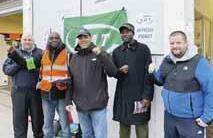
RMT members have delivered a decisive ballot result in their campaign to protect pensions, working agreements and prevent job losses on the London Underground.
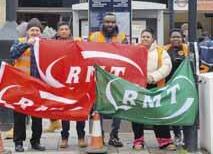
91.1 per cent voted yes in the ballot on a 53.1 per cent turnout, meaning that tube workers have the right to continue to withdraw their
labour in the coming weeks and months.
Transport for London has plans to cut 600 jobs and want to undermine RMT members pension entitlements.
RMT general secretary Mick Lynch said that it was a fantastic result for members and proves that the arguments the unions has

been making are endorsed by tube workers.
"TfL and the Mayor of London need to seriously rethink their plans for hundreds of job cuts and trying to take hard earned pensions from workers who serve the people of London on a daily basis.
"We are acutely aware of the funding cuts being foisted on TfL by the Westminster
government. However, Mayor Sadiq Khan needs to mount a serious campaign for the people of London, to get the capital city the funding it deserves for its public transport.
"He should not be trying to sacrifice our members pensions and jobs to fit within budget restraints laid down by Boris Johnson,” he said.
RMT members working as train managers for Avanti suspended further strike action after the company agreed to engage positively with the union over the imposition of rosters.
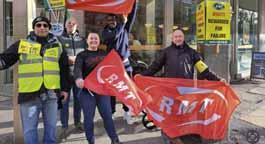
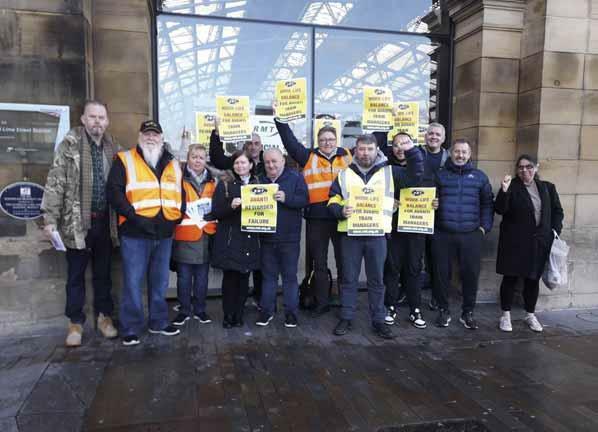
The company had previously claimed that they were imposing rosters to prevent cancellations but continued to cancel trains and those that did run were hugely overcrowded.
Avanti train managers were angry at having their work life balance ruined, with significant cuts to rest days and short notice changes to shift patterns.
Morale was at an all-time low and members wanted to see their concerns addressed in order to provide a decent
service to passengers.
As a result of negotiations rosters have been agreed with agreed additional rest days, training days were re-inserted and stability had returned in terms of industrial relations at the company.
RMT general secretary Mick Lynch welcomed the victory and congratulated members for the stand they had taken.
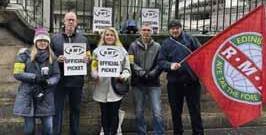
"It is unfortunate that train mangers felt they had to fight for their rights at work in this way but it has forced the company to treat reps with the respect they deserve.
“I would also like to thank the reps and officials for taking up this struggle for fairness at work which has clearly paid off," he said.
Workers in ScotRail have won a significant victory in their fight for a decent pay rise, job security and good working conditions.
Following an industrial campaign which included two days of strikes, most Scotrail members have won a pay rise of between seven and nine per
cent backdated to April, an extension of the no compulsory guarantee for six years and a series of payments to enhance the wage packet on a yearly basis.
Members also won improved maternity payments and Sunday working benefits among other improvements.
RMT general secretary Mick Lynch said that it was a fantastic victory for members at Scotrail and congratulated them on their strong stand, without which there would have been no deal reached.
"The pay rise on top of further payments and improvements to working
conditions will help with the cost-of-living crisis and ensure that the travelling public are not inconvenienced further.
"This negotiated settlement shows what can be done when employers behave reasonably and are willing to do a deal,” he said.
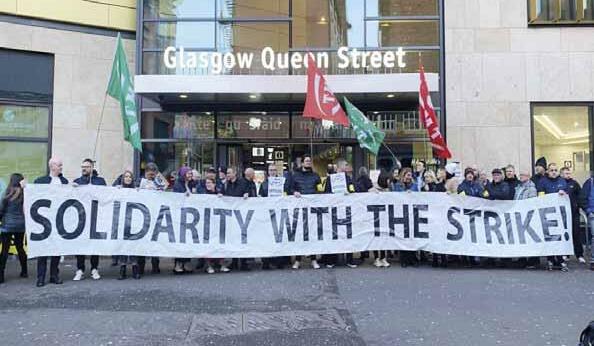
Up to 25 RMT Signallers and Electrical Control Operators picketed out Network Rail’s Thames Valley Signalling Centre in Didcot, Oxfordshire in November in
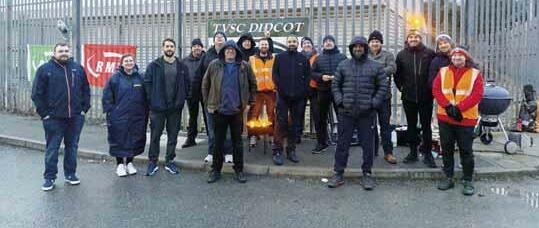
support of victimised RMT signallers and operations rep, Mick Knox.
Despite atrocious weather, they were in great spirits with a marquee courtesy of
construction workers at an adjacent site, a barbecue and England’s opening World Cup match against Iran on a picket line TV. Two 24-hour strikes by the Network Rail Operations
staff caused massive cancellations of train services and engineering possessions across the Great Western mainline. They are currentlly being re-balloted.
Union slams government for cutting public transport jobs and investment instead of carbon emissions
RMT research has revealed that Network Rail is nowhere near its own rail electrification targets as the government imposes austerity and managed decline on Britain’s railways.
On the eve of the Global Day of Action on Climate Justice to coincide with COP27, union research shows that Network Rail is currently completely failing to match its net zero commitments on decarbonising our railways, ensuring that Britain continues to fall behind other countries in investing in faster, more efficient and green railways.
Network Rail's Traction
states that over 8,000 miles of railway line needs to be electrified by 2050. Yet statistics from rail regulator the Office for Rail and Road, analysed by the RMT show that Britain needs to electrify its track at a rate of around nearly 300 miles every year, but in the past year 2021-22 managed to electrify just over one mile of new railway, the lowest figure for three years.
The research comes on the back of Network Rail CEO Andrew Haines’ recent comments that it was ‘almost impossible’ for the company to achieve its electrification
objectives in the current climate given its cost.
The union warned that with the government fixated on preserving chaotic and inefficient structures and seeking cuts across the industry, there was little hope of meeting decarbonisation goals.
RMT general secretary Mick Lynch said that transport was the UK’s largest emitting sector of Greenhouse gases yet instead of cutting carbon emissions the government was cutting public transport jobs and investment.
“Instead of investing to improve services and rapidly
decarbonise our transport sector, they are undertaking a managed decline of our railways, which is compounded by persisting with a disastrously fragmented privatised rail system which is a barrier to long term rail investment and retention of skills needed to improve our railway infrastructure.
“If this government was serious about the climate emergency, it would recognise the vital role that our railways and public transport must play in cutting climate emissions,” he said.
Following mass cancellations on struggling Avanti West Coast services, catering services are now in a similar chaotic state caused by job cuts and poor management by the train operating company owned by FirstGroup and Trenitalia, RMT said today.
Despite promising enhanced catering services on the franchise when it took over from Virgin, Avanti West Coast has actually cut nearly 200 catering jobs which has led to staff shortages, plummeting levels of service and massive uncertainty.
RMT general secretary Mick Lynch said that the company was in such a mess that it could not offer at seat services for passengers despite the fact that the company claims that it can.
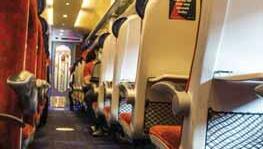
“Avanti front line catering staff are also facing increasing levels of frustration, aggression and confrontation from passengers who are not receiving the level of service that they are expecting for the cost of travel.
“This level of mismanagement is something that we have come to expect
with this operator which should be providing stability on this crucial line but is clearly unable to do so.
“This is another example as
if one was needed of the necessity of public ownership and control of our railways,” he said.
After taking days of industrial action bus workers in Somerset and Cornwall working for First South West have overwhelmingly backed a pay deal of up to nearly 18 per cent increase in a referendum.

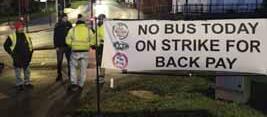

Under the deal existing drivers will see a 17.6 per cent uplift on the basic hourly rate and the overtime rate will increase by 16.2 per cent.
Rates for engineering,
cleaners and supervisory staff will be increased in the same way.
The lowest paid staff will have a minimum increase in their basic hourly pay above these percentage rates and any worker currently on less than £10 per hour will be moved to £10.
The company has also agreed to meet RMT representatives every January, April, July and October to





discuss how to recruit and retain workers to assist on future decisions that may need to be made around pay and conditions.
The pay anniversary date will remain at April from April 2024.
RMT general secretary Mick Lynch said that it had been quite obvious from the beginning of the dispute that First South West could pay workers a decent wage rise.
“First South West is a subsidiary of First Group which had paid out £500 million to shareholders in 2021/22 and reported an operating profit of £226 million.
“The union hopes that the company will now negotiate in good faith in the future based on the contribution FSW workers make and the service they provide to the community,” he said.

Strike action by RMT members working on the railways went ahead last month after the Rail Delivery Group and Network Rail were prevented from engaging with the union by the government.

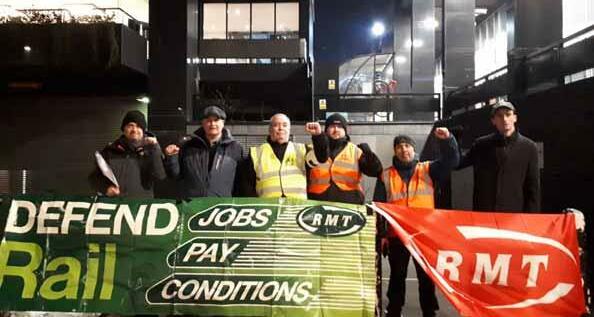
Members at Network Rail also voted overwhelmingly to reject the latest offer on an 83 per cent turnout.
This led to all strike action at both Network Rail and the 14 train operating companies under the Department of Transport mandate.
Rail Delivery Group negotiators, representing the train operating companies, made it clear to union negotiators that Downing Street had withheld the mandate for employers and torpedoed talks.
RMT general secretary Mick Lynch said that there was no reason why the dispute with the TOCs could not be settled in the same way that the union had resolved disputes in Scotland and Wales.
“Where the Scottish and Welsh governments had responsibility for mandates, pay settlements for 2022 have been agreed and neither of
these settlements have been conditional on cutting staffing, and eroding safety, security and accessibility.
“It is a national scandal that the government has been paying the train operating companies not to settle the dispute, indemnifying them to the tune of £300 million so that they have no incentive to reach a resolution,” he said.
The Network Rail offer included a pay rise over a two-
year period in return for thousands of job losses, a 50 per cent cut in scheduled maintenance tasks and a 30 per cent increase in unsocial hours it will try to impose with immediate effect.
Mick Lynch said that there had been a huge rejection of Network Rail's substandard offer as members were determined to take further strike action in pursuit of a negotiated settlement.
"The government is refusing to lift a finger to prevent these strikes and it is clear that they want to make effective strike action illegal in Britain.
"We will resist that and our members, along with the entire trade union movement will continue their campaign for a square deal for workers, decent pay increases and good working conditions,” he said.
RMT members at Pullman


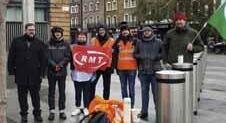

Rail, owned by Transport for Wales, have won an improved offer after members voted overwhelmingly for strike action,
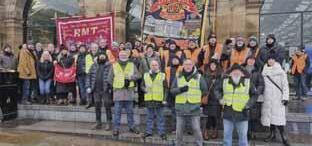


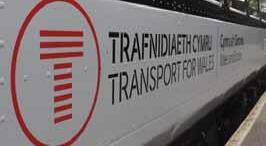
Two days of strike action was suspended last month at the company which specialises in the overhaul and refurbishment of traction and rolling stock, after it presented an improved offer.
The company initially offered 4.5 per cent at a time when inflation had hit double figures. Following the threat of
industrial action, the company revised a no strings offer of up to 8.4 per cent backdated to April.
This included a £1,500 uplift on the basic rates for all grades below £33,350 plus an unconsolidated payment of £1,000 which meant that members received over £2,000 before Christmas.
RMT general secretary Mick Lynch congratulated the membership for standing firm.
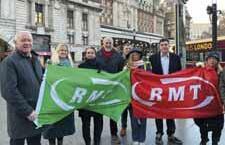
“The company accepted the strength of felling among its workforce and has
responded in a positive manner.
“It goes to show that there is no substitute for industrial
it matters,” he said.
RMT Health and Safety advisory conference and training this year takes place in York at Park Inn Radisson on February 21/22 and celebrates its 20th anniversary.
Conference has agreed to do things a bit differently and hopes that safety reps will appreciate this ‘new look’ conference and encourage reps who haven’t attended previously to do so.

The first day involves training subjects including risk assessment, working in extreme weather, safety representatives and safety committees, the “Brown Book” and Health and Safety at Work Act introduction/refresher, clean
air at work, stress, and the office of Rail and Road (ORR)’s Risk Management Maturity Model (RM3).
For the first time an RMT Safety Rep of the Year award will be given. Conference will also have an opportunity to scrutinise the role of the Office the Rail and Road Regulator (ORR) as Ian Prosser, Chief Inspector of Railway, will speak about the role of the regulator, particularly in respect to its role in investigating incidents caused by contingency staff during this year’s RMT industrial action.
The best advert for the conference is from the RMT advisory committee safety reps who help organise
conference: STEVE LAYNE (GWR): “Each conference gives me something to get my teeth stuck into back in the workplace”.
KEN SHARP (LNER): “Conference gives me an opportunity to talk with likeminded people that know the struggles and issues we are all face day in and day out with in our workplaces”.
“You can discuss problems and issues and get support
from other health and safety reps, so it is a good opportunity for networking to help you out after the conference.
CRAIG MILLS (GWR): “For me, the conference gave me an excellent opportunity to network and meet likeminded reps”.
For more information on health and safety conference contact your branch secretary or email s.Friday@rmt.org.uk

RMT’s health and safety conference celebrates 20 years when it meets in York next month
RMT members working as contracted out cleaners throughout the transport network have voted for industrial action for the first time and will strike on December 22 23, and 31.
Over 1,000 outsourced cleaners working for the likes of Churchill, Atalian Servest and Mitie are taking strike action and rail companies who use contracted out cleaning providers such as Avanti West Coast, GWR, LNER and TransPennine Express will be affected.
Cleaners are demanding £15 an hour, company sick pay, decent holidays and good pensions from contractors - some of whom are raking in profits of over £100 million.

RMT general secretary Mick Lynch said that it was an historic result and congratulated cleaner members across the transport network.
"Cleaners are an integral
part of our railways and it is a national disgrace that many languish on the minimum wage, with no company sick or holiday pay, when they were rightly considered heroes during Covid.
"These companies are raking in millions of pounds worth of profit, and it is high time they handed over a chunk of that money to their hard-working staff rather than rewarding greedy shareholders.
"Ultimately all contracted out services should be brought back in-house and we will fight tooth and nail for pay justice for our people in this industrial campaign.
“It is scandalous that multimillion pound companies are making hand over fist profits while not paying cleaners properly.
“RMT will fight every step of the way to end the superexploitation of contracted out cleaners and will not rest until
these greedy companies pay up,” he said.
Days of protest action have also been called for Atalian cleaners on GWR and Avanti at their London headquarters. As well as Atalian cleaners on LNER and Bidvest Noonan at their York headquarters. Mitie cleaners will also be protesting Transpennine Express and Atalian on Avanti West Coast together with Bidvest Noonan (Alstom TPE) in Manchester.
RMT’s National Dispute Fund received a generous £10,000 boost this month from RMT volunteers at Glastonbury Festival working for the Workers’ Beer Company
Battersea & Wandsworth Trades Council has run Workers’ Beer Company as a not-for-profit venture since 1986, helping grass roots organisations including trade unions, fundraise whilst having fun.
In July 2022, 65 RMT members, their families, friends and a very special retired BR Gold Card holder, Maureen Sheridan, spent a week working at Glastonbury to fundraise for their own campaigns.
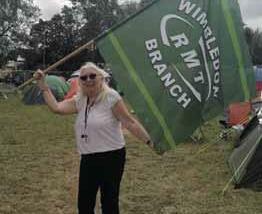
Maureen, now in her early
70s, started work as a railway Cleaner at Streatham Hill depot. She was training to become a guard, when her Station Manager noticed her Irish School Leaving Certificate and put her forward for a clerical role at Gypsy Hill, near Crystal Palace in south London.
Maureen went on to become a British Rail Trainer, delivering courses to shunters, guards and clerical officers at King Cross before moving to BR Intercity at Euston. She travelled the network developing and delivering training courses, eventually becoming a BR Management Grade (MS3).
Maureen left the railway at privatisation but remains a
great supporter of rail workers and the passengers she loved working with. Maureen has passed on her enthusiasm for
the railway to her son, Will Sheridan who is an RMT member as a guard at Southern Trains.
RMT has exposed the weaknesses and costs of the outsourcing model as it fragments services in the rail industry. For example, train operating companies have little knowledge of what cleaning was taking place and how many cleaners were working to provide this essential service.
Rail cleaners reported that they did not have enough staff working on their contracts. This is a consequence of the actions of outsourcing companies, who seek profits by driving down labour costs by holding down pay, which creates regular turnover of staff, and by cutting jobs.
However, as RMT’s new report ‘Corporations Cleaning Up’ shows the pandemic has been pretty good for the ‘facilities management’ (FM) business. For these companies Covid has meant new and renewed contracts to provide enhanced services, at least in theory. This may be good news for shareholders and executives but has meant little or nothing to the cleaners on the ground.
RMT analysed the accounts of seven facilities management companies with contracts on the railways to see how they have fared during the pandemic and subsequent cost-of-living crisis.
Some companies made net profits after tax of £32 million in 2020 but that these profits trebled to £101 million in
2021. All but one company recorded bigger profits in 2021 than in 2020 (Table 1).
Perhaps more interesting was the fact that they also all made bigger profits in 2021 than in 2019, the year prior to the pandemic. In aggregate their profits for the year more than doubled on those from 2019.
These increased profits led to higher overall dividend payments. Five of the seven companies paid dividends during the two pandemic years. Dividend payments overall for the seven companies were many times higher in 2021 than in the pandemic year but they were also three times the size of payments in 2019 (Table 2).
• Atalian Servest paid dividends in both years totalling more than £22 million. It has also paid interim dividends worth £8 million in 2022.
• Mitie plc paid a dividend of £25.2 million in 2021-22 after missing a year in 2020.
• Bidvest Noonan paid a dividend of £14.6 million the same year. The cleaning rich list
It’s been a good time for the cleaning rich list too. The CEOs of Mitie and ISS at group level both saw double digit, inflation busting pay rises. ISS’s Jacob Aarup Andersen got £1.8 million in 2021, but the standout winner
was Mitie’s Phil Bentley whose remuneration package was worth £3.8 million last year.
One step down at the level of the main facilities management subsidiaries, managing directors at Atalian, ABM, Bidvest Noonan and Carlisle all saw double-digit inflation-busting pay rises with Atalian Servest’s managing director getting a 32% pay rise that took him up to £1.7 million.
This increased profitability and the opportunities to be made from the need for cleaning during the pandemic may well explain why there has been a spate of buyouts, takeovers and measures designed to manipulate share prices among the facility management companies.
• In March 2020, Churchill secured private equity fund investment from a fund named ESO Investco VII Sarl, managd by Soho Square Capital Partners and from Intertrust UK Ltd, a subsidiary of Intertrust UK.
• In February 2021, South African outsourcing conglomerate Bidvest used its Irish subsidiary Bidvest Noonan to acquire Axis Contract Services.
• In July this year, Atalian Servest’s parent company the French outsourcing
giant Atalian Group announced that it had received an offer of acquisition from private equity fund Clayton Dubilier and Raice (CD&R) and merged with OCS Group International.
• In June 2022, Mitie announced a £50 million buyback of its own shares. Share buybacks are a technique of financial engineering that boosts share prices by reducing the stock of available shares and its asset base. A rising share price is good news for a company looking for finance or, for executives like Mitie’s Phil Bentley, whose pay is tied to share price performance. Cleaners on rail are typically paid at around the same rates as cleaners elsewhere in the economy. That means they are paid at or around the National Minimum Wage of £9.90 an hour or at best the Real Living Wage, currently set at £9.90 an hour and due to rise by next May to £10.90. Cleaners get no company sick pay, most of them get no travel facilities and no decent pension provision. Their experience of the pandemic and the subsequent cost of living crisis has been very different. As we will show in a subsequent report, their pay has been held down, losing value radically and throwing them even further into economic distress.
One class of people has enriched themselves at the expense of the people who make their wealth and who took the risks with their lives during the Covid pandemic. Cleaners deserve a better deal. They deserve higher pay, proper sick pay provision, decent pensions and they should be in-sourced as fast as possible.

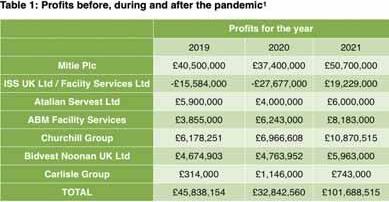
We are seeing significant investor interest in FM [Facilities management] and the wider business services sector due to the essential nature of the services they provide, ensuring visibility of income at time of significant uncertainty in the wider market.” Usman Malik, Partner and Head of Business Services at Grant Thornton UK LLP
We have delivered a strong performance in H1 across all our divisions as the addition of Interserve Facilities Management and the contribution from COVID-related contracts boosted the performance of our business. We are beginning to generate good free cash flow and our new long term financing arrangements reflect our strengthened balance sheet and BBB credit rating. With our underlying business back to pre-COVID levels, we have reinstated our interim dividend”.
Phil Bentley, Group Chief Executive, Mitie, November 2021.
2019-2022
update.company-information.service.gov.uk/company/00890885)
ABM Facility Services Ltd (https://find-and-update.company-information.service.gov.uk/company/03461565), Atalian Servest Ltd (https://find-and-update.companyinformation.service.gov.uk/company/06355228 )
Churchill Contract Services Group Holdings Ltd (https://find-and-update.company-information.service.gov.uk/company/07317156
Bidvest Noonan (UK) Ltd (https://find-and-update.company-information.service.gov.uk/company/05049403) Carlisle Support Services Group Ltd (https://find-and-update.company-information.service.gov.uk/company/07880629)
Our investments | Soho Square (soho-sq.com)
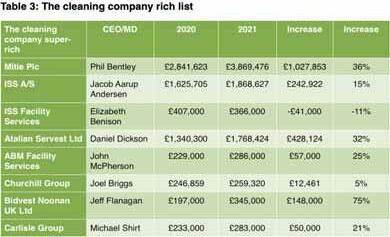
FSM - Bidvest Noonan acquires specialist support services concern Axis Group (fsmatters.com)
DOSSIER DE RENOUVELLEMENT (atalian.com)
Mitie-Full-Year-Results-2022.pdf https://bdaily.co.uk/articles/2022/07/11/grant-thornton-leads-on-strategic-sale-of-incentive-fm-group https://www.mitie.com/wp-content/uploads/2021/11/Mitie_HY21-22_Regulatory_Announcement.pdf
“
“
In October as RPI inflation topped 12.6 per cent, RMT conducted a survey of cleaning grade members asking them about the impact of the cost-of-living crisis.
More than 1,000 cleaners responded over just five days. The report ‘Cleaners in the cost-of-living crisis’ contains the findings of the survey and explains why cleaners are rising up and why the union is balloting more cleaners than ever for industrial action on the railways.
RMT’s 2021 report, Cleaning Up the Railway, revealed that most cleaners are outsourced and that their wages are held down to generate profits. As a recent report conducted on behalf of the Office of Rail and Road expressed it, typically cleaners’ “pay is low (and heavily influenced by the statutory minimum), premiums for unsocial hours working have been reduced or removed, and the wider reward package is minimal often only providing statutory minimum entitlements”.
RMT’s data on collective agreements, pay rates and survey evidence confirms this for the rail industry. RMT’s survey data shows that outside London 44 per cent of cleaners earn below £10 an hour (Figure 4) but that this figure rises to almost 70 per cent when insourced cleaners employed by Transport for Wales, Northern Trains and Scotrail were excluded (Figure 5). Outsourced cleaners employed outside overwhelmingly earn between
£9 and £9.99 an hour. Inside London, around 80 per cent of cleaners are employed around the London Living Wage, between £11 and £11.99 an hour (Figure 6). In addition, outsourced cleaners do not have occupational sick pay or decent pensions.

The escalating cost-of-living crisis has had a catastrophic effect on the already-low pay of these workers. As inflation has risen more rapidly, so these wages have declined sharply in value. Figure 1 below shows the decline in the earning power of both the National Minimum Wage (NMW) and the Real Living Wage (RLW). Even allowing for the uplift to the NMW in April, this is worth significantly less than a year ago. The value of the RLW has also fallen in the last year and even the recent uplift will not have reached cleaners yet as implementation by accredited employers is not mandatory and they have until
May 2024 – eight months away - to put it in place.
• A full-time worker on the National Minimum Wage is around £880 a year worse off now than they were 12 months ago.
• A worker on the Real Living Wage would be £500 a year better off than they were 12 months ago, assuming that their employer instantly implemented the new rates. Given that the vast majority won’t have done, a cleaner on the RLW will still be £900 a year worse off.
• A worker on the London Living Wage will be almost £1,700 worse off than they were 12 months ago. This fall in wages has certainly been felt by cleaners. 96 per cent of cleaners surveyed told the union that they felt worse off in financial terms than they did last year.
In June 2019, RMT surveyed cleaners asking them
about whether their wages enabled them to make ends meet. 63 per cent said they sometimes or regularly struggle to get by on what they earn.
When the union put the same question to cleaners again in October 2022, the results were starkly different. 84 per cent of people responding said they sometimes or regularly struggled to make ends meet, with 55 per cent saying they regularly struggle.
The survey also contained shocking details of the kinds of measures these low paid cleaners were driven to in order to try to make ends meet. With the escalating energy costs, 62% of cleaners reported having reduced their use of heating and hot water. Half of cleaners reported having had to ask friends or family for financial help. More
than one in three are relying on credit cards to cover everyday spending. 28% said they are missing meals and 26% reported having to cut spending on their children. 13% of cleaners, more than one in 10, reported resorting to food banks in the last year.





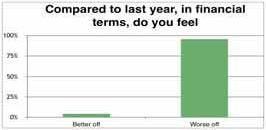
The cost-of-living crisis among cleaners is a disgrace to the transport industry. People who put their lives on the line to keep trains and stations safe to use during the Covid-19 crisis are being betrayed.
These cleaners are being preyed on by a group of outsourcing companies whose profits have doubled from before the pandemic, but who are determined to hold down workers’ wages and lock them into ever deeper impoverishment to keep the dividends flowing to the superrich.
This predatory behaviour is taking place with the full knowledge, connivance and support of Executives in Network Rail, the Train Operating Companies and Transport for London. These companies shamefully wash their hands of responsibility claiming that pay rates and employment conditions are the responsibility of the employer, not the contractor.
This is why cleaners are rising in the rail industry and across the economy and there will be no return to before the pandemic. And that is why the industry must change. It must raise pay for cleaners across our rail networks, bring in proper sick pay, implement free travel and bring in proper pensions so that cleaners can have a decent pension in retirement. And they must end their complicity in this shameful employment model and put an end to the scourge of outsourcing.
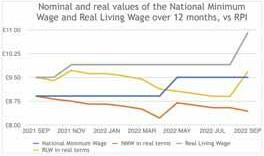

Last October saw the launch of RMT’s first ever Disabled Transport Workers’ Charter. Four years in the making, the committee was privileged to welcome Marsha de Cordova, Labour MP for Battersea and herself disabled, to the launch. She praised the ten-point charter and what it will mean to disabled members going forward.
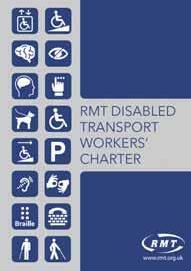
The charter itself has been produced by disabled members striving for all employers in our remit at least (begin to in some cases) to adopt the social model of disability and best support those of us with a new or worsening condition. The 10point plan details what the union should all be campaigning for in the workplace.
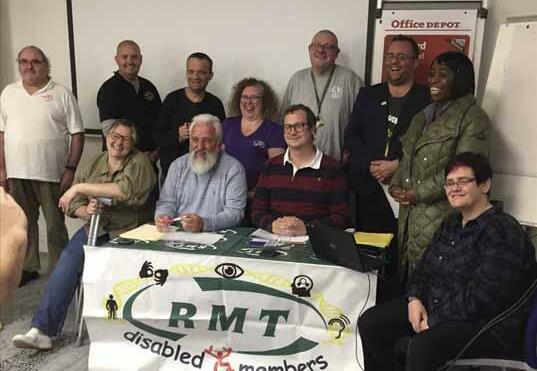
These points are:
1) Social model of disability
2) Physically accessible workplaces
3) Accessible workplace communications
4) Mentally healthy workplaces
5) Control over how we work
6) Fair and accessible recruitment, promotion and training processes 7) Adjustments when we need them 8) No detriment or disciplinary action for disability-related absence 9) Nothing about us without us
10) Support and rights for carers
It goes without saying that levelling the playing field for colleagues with disabilities aids recruitment, retention and even progression. Most importantly, achieving all 10 points in the workplace is hugely beneficial to retention. How many times have we heard people comment “they’re never at their work” without knowing a colleague’s
reason for absence? How many times have we heard of workmates being “encouraged” to resign, writing off any transferable skills because it’s easier to show them the door instead of redeploying them? These kinds of comments and examples are much more common than “I have the right adjustments in place to keep me at work”, I’d guess.
If employers remove as many barriers as possible, this benefits all workers, creates an inclusive workplace and boosts morale.
All of my various roles within the union come to an end shortly but I will always look back on my time on DMAC with pride. The committee is formed of just the best people striving to make change where it’s needed.
I’d advise all members to take note of this charter as you never know what’s around the corner and when it may come in handy. Charters are available from branch secretaries or email: j.webb@rmt.org.uk
FEBRUARY
RMT National Health & Safety Conference 22 York
RMT Young Members’ Conference 24–25 Hastings
RMT Industrial Organising Conference of Signalling & Operations Grades 25 – 26 Newcastle MARCH
RMT National Women’s Conference 3–4 Newcastle

RMT National Education Conference 14 Doncaster
RMT Black & Ethnic Minority Members Conference 20–21 Bristol

RMT National Industrial Organising Conference of Catering Grades 25 Plymouth APRIL
RMT Industrial Organising Conference of Station & Associated Grades 14 –15 Hertford
RMT Industrial Organising Conference of Supervisory & Associated Grades 14 –15 Hertford
RMT Disabled Workers Conference 19 –20 Newcastle
RMT Retired Members’ Conference 20 Manchester
RMT Industrial Organising Conference of Engineering Grades 20 –21 Great Yarmouth
RMT Industrial Organising Conference of Train Crew & Shunting Grades 20 –21 Newcastle
RMT Freight & Logistics Industrial Organising Conference 22 Peterborough
RMT Bus Workers Industrial Organising Conference 28 Torquay MAY
RMT National LGBT+ Conference 17–18 Perth

On New Year’s Eve 2019, the World Health Organisation (WHO) was informed of a cluster of cases of pneumonia, of unknown cause, detected in Wuhan City, Hubei Province, China. On New Year's Day 2020, I started as a health and safety rep. Someone up there has a sense of humour as soon we’d all be losing our sense of smell.

Joking aside, being an RMT health and safety rep during the pandemic was particularly challenging and at times devastatingly sad. I pushed myself harder than perhaps I should have and saw many comrades doing the same. I was struck time and time again, however by how incredibly supported I was in my role.
As I come out the other side, I feel like I made my workplace a safer place and I know that I grew in confidence as a rep and as a Union member. However, as an RMT young member and a health and safety rep, I am in the minority. Many of our health and safety reps are in fact getting towards the age where
they will want to start a wellearned retirement.
At a recent young member’s meeting, I asked if anyone else had been a health and safety rep. While the majority had held positions at branch, most people had been industrial relations reps. Possible reasons for the lack of younger members being health and safety reps included, not being as interested in that area, an impression that there is quite a lot of knowledge required, existing reps doing a good job. One of the few other such reps said that they started doing it because no-one else wanted the position, a similar situation to mine. However, we both found it to be very fulfilling in the end. Many people attending the meeting didn't realise how much protected time came with health and safety positions to allow you to get trained and to do the role properly.
To overcome some of these barriers, RMT’s health and safety advisory committee and young members advisory committee are now working together on a strategy to
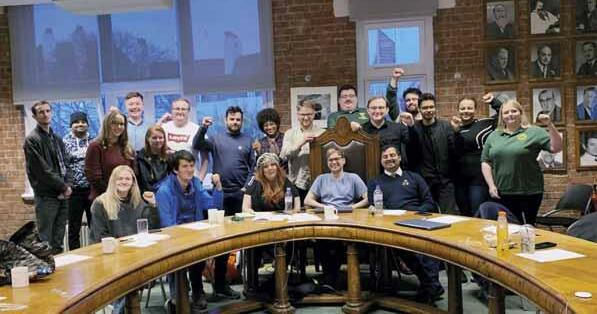
tackle the lack of younger members in rep positions and to ensure that knowledge and skills are being transferred within our membership.
At the health and safety conference next month Ann Joss will be signing up people willing to mentor younger members interested in becoming health and safety reps in their workplace.
I will be asking delegates to the young members conference to come with prior knowledge of any health and safety vacancies in their branch. We will also be hosting Shelly Asquith, the TUC’s health, safety and wellbeing officer who has been doing great work on bringing through young health and safety reps for many years. Hopefully, young members will be inspired to take up local health and safety positions or to find and support another young member into a vacant position within their branch, if there isn’t a vacancy for their own workplace currently
I found that being a Health and Safety rep can be a big
job, but it becomes manageable when you realise that you are generally released from normal duty to do it and the training available from the union and the TUC is very comprehensive. I would encourage all young members to consider taking up a health and safety position, even if they are initially daunted by the fact that it can involve laws and paperwork. In fact, most of the job is common sense and the other stuff can be learned as you go along, with courses to develop your knowledge further each year, and lots of experienced reps around you to consult.
Ultimately, much worse than a new health and safety rep, is no rep at all. So, don’t delay if you are or you know a younger member who might be interested in becoming a health and safety rep, encourage them to come to branch, help them get elected to the position and show them how to get released for the training courses, or feel free to put them in contact with me at YMchair@RMT.org.uk


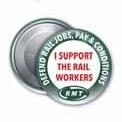




The ‘Big Four’ was the name used to describe the country’s four largest railway companies that were created on January 1, 1923 and lasted until full scale rail nationalisation in 1947.
These were the Great Western Railway (GWR), London, Midland and Scottish Railway (LMS), London and North Eastern Railway (LNER), Southern Railway (SR) covering much of the rail network which had grown to almost 20,000 miles of track.
This reorganisation has often been viewed as a classic British ‘fudge’, designed to pre-empt growing calls for state ownership, not least from the National Union of Railwaymen (NUR), while ensuring ongoing dividends for shareholders, despite initial hostility to the plan.
The railways had been taken into government control at the outbreak of World War One but were returned to the original owners in 1921, three years after the war had ended. Despite the trauma of the First World War, which had created staff, locomotive and rolling stock shortages, many of the

largest companies were financially healthy, unlike the exhausted ‘Big Four’ after World War Two.
This was because when the railways came under state control in 1914 it was managed by the Railway Executive Committee which was made up of leading general railway managers. One of its first acts was to guarantee revenues for shareholders at 1913 levels, a very successful year, with no mention of how rail workers or rail infrastructure would fair for the duration of the conflict.
NUR general secretary James Henry Thomas, a serving MP for Derby, raised this “one-side arrangement” in the House of Commons but was brushed aside directly by the Liberal Prime Minister Asquith.

As a result, the NUR spent the war fighting for wages to keep up with rampant inflation. The war also saw the growing influence of District Councils and Vigilance Committees made up of men and increasingly women, who had been accepted into membership in 1915, angry at
rampant profiteering.
An NUR Special General Meeting (SGM) in November 1917 in Leicester discussed ‘After War Matters’ and drew up a national programme for
the post-war period including rail nationalisation which was presented to the government at the end of hostilities. This was initially received favourably leaving the
One hundred years ago over 120 railway companies were merged into four new entities to avertANTI-UNION: Tory leader Andrew Bonar Law blocked railway nationalisation and was part of the aggressively anti-trade union coalition government led by Liberal leader Lloyd George that tried to slash rail workers’ wages which led to the great railway strike of 1919.
impression with many voters that the government was in favour of such a policy.
In March 1918 the Prime Minister Lloyd George told a TUC delegation that he was in ‘complete sympathy’ with rail nationalisation and assured them that ‘they could not go back to the old system’.
A general election was called for December 14, 1918 almost immediately after Armistice with Germany and Minister of War Winston Churchill along with other ministers openly pledged themselves to nationalising the railways.

He told a luncheon in Dundee a few days before the vote: “So long as the railways are in private hands they may be used for immediate profit. In the hands of the state, however, it may be wise or expedient to run them at a loss if they develop industry, place the trader in close contact with his market, and stimulate development”.
Not surprisingly voters took these politicians at their word but South Eastern and Chatham Railway chair Mr H Cosmo-Bonsor had a firmer grip on reality when he told shareholders after the election that ‘they should always take utterances of a gentleman who is standing for Parliament with a grain of salt’.
The Ways and Communications Bill of February 1919 did initially include powers of State purchase of transport. But in July 1919 Andrew Bonar Law, leader of the Conservative party and Chancellor of the Exchequer in David Lloyd George's newly elected coalition government, declared his opposition to railway nationalisation and the power to nationalise was quietly dropped from the bill.
The cause of transport nationalisation was also rather undermined by the increasingly erratic NUR general secretary Thomas who had been through a bruising though largely successful
national rail strike in October 1919. By March 1921 he ruled out state ownership ‘because of the absence of common sense and intelligence among the workers themselves’.
Instead, the Railways Act 1921, also known as the Grouping Act, was enacted to move the railways away from clearly wasteful internal competition and retain some of the benefits derived from a government-controlled railway during the First World War paving the way for the creation of the ‘Big Four’.

To ensure its adoption in Parliament the employers had reached a Memorandum of Understanding with the rail unions for National Wages Boards to continue but the idea of worker-directors was dropped. However, importantly, rail unions did finally win the right to represent workers in disciplinary cases something that railway directors had opposed vigorously for many years.
The flamboyant Mr Thomas, soon to be Secretary of State for the Colonies in the
incoming Labour government of 1924, sold the Bill to an NUR Special General Meeting in August 1921 ‘as near perfection as the brain of a man can make a Bill’.
This was to be the high point of optimism for industrial peace before the bitter results of the general strike and the global economic crash that were both to come before the end of the decade.
At the outbreak of World War Two the railway companies' managements were once more united under the direction of the Railway Executive Committee. The railways were hired by the
government from January 1, 1941, to continue for one year after the end of the war.
The shock outcome of the 1945 general election saw a massive Tory defeat and a Labour government was elected with a majority of more than 150 on a manifesto pledging the nationalisation of the Bank of England, the fuel and power industries, inland transport, and iron and steel.
As a result, the ‘Big Four’ were finally taken into public ownership to form the core of British Railways on January 1, 1948, exactly 25 years after they were created.
RMT has condemned the brutal killing of the Palestinian journalist Shireen Abu Akleh, 51, in May this year. This was another horrific demonstration of the often-deadly violence that journalists, medics, and other civilians face in Palestine and the Occupied Palestinian Territories.
Shireen Abu Akleh was a Palestinian American and one of the Arab world’s bestknown journalists, who had covered the Israel Palestine conflict for decades. Shireen had been covering an Israeli military raid in the Jenin
refugee camp in the West Bank and was wearing a helmet and body armour clearly marked “PRESS. She was shot in the head.
Shireen's name has now been added to the long list of journalists killed or injured by Israeli armed forces. Since the shooting The Office of the High Commissioner on Human Rights (OHCHR) alleged that Israeli forces were behind the fatal shooting in the West Bank - not indiscriminate Palestinian firing, as Israeli authorities initially claimed. In
September, the Israeli authorities announced that there was a “high possibility” that Shireen had been hit accidentally by the Israeli military but so far no criminal investigation has been launched by Israeli authorities.
In November a UN Human Rights Council-appointed probe into alleged rights violations in the Occupied Palestinian Territory heard testimony on the killing of Shireen. Also, in November the US Department of Justice announced it was also launching an inquiry into the

killing which was welcomed by Shireen’s family but denounced by the Israeli government.
RMT stands shoulder to shoulder with Shireen Abu Akleh’s family and friend’s demands for justice. The Palestine Solidarity Campaign which RMT is affiliated to is calling on the public to email their MPs asking them to sign EDM 34 “Killing of Shireen Abu Akleh” which you can do by visiting https://palestinecampaign.eac tion.online/justiceforshireen
Australia’s National Maritime Museum on Sydney’s historic waterfront was the setting for an international conference hosted by MUA President, Christy Cain and National Secretary, Paddy Crumlin.
Maritime unions took part from across Asia and the Pacific delegates from Hawaii, Vancouver, San Francisco, and Los Angeles. Conference was opened by Aunty Rhonda Dixon, an Australia’s First Nations elder and daughter of legendary MUA ‘wharfie’ Chicka Dixon.
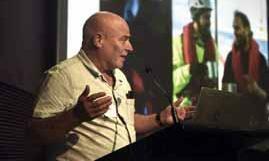
Chicka Dixon, a leading MUA member in the Aboriginal rights movement recalled challenging a racist colour bar at a Sydney hotel in the 1950s.
“The bartender said: `I’m sorry… We won’t serve Aborigines.’
“`Well that’s all right,’ Chicka replied, ‘tomorrow evening I’ll have 300 waterside workers up outside your joint. Nobody’s going to get in because we’re going to blacklist this hotel. Then I’ll get the Trades & Labour Council and the Liquor Trades Union to pull the barmaids out. Well, he did a complete about face. Remarkably, blacks are welcome down there now!’”
The MUA’s 150th anniversary celebrated a union always at the heart of struggles for workers’ and peoples’ rights both in Australia and internationally, ever since the first Sydney Wharf Labourers’ Union and Melbourne Seamen’s Union were founded in 1872.
Australian Council of Trade Unions secretary Sally MacManus recalled the SS
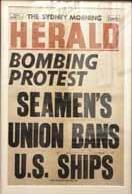
Dalfram dispute at Port Kembla in 1938, when the Waterside Workers' Federation, MUA’s forerunner, refused to load pig iron for Japan’s war in China.
Again in 1945 Australian maritime unions tied up 559 military supply ships in port"the greatest boycott of its kind in Australian history”when the Dutch tried to reclaim their colony in Indonesia.
In 1948, the Seamen’s Union of Australia boycotted arms and equipment shipments to the British army suppressing Malaya’s independence movement.
In 1950, when the SUA banned shipment of war supplies during the Korean war, the Attorney-General charged the SUA Executive Committee with treason under the Commonwealth Crimes Act.
In 1967, the Australian government sent the Boonaroo to carry bombs to South Vietnam, and again crews refused to take military cargo. SUA Victoria branch secretary Bert Nolan stated:
Great workers’ leaders such as E.V. Elliott, Secretary of the SUA, and WWF General Secretary, Jim Healy led from the front with their proud internationalism and political trade unionism.
Australian maritime unions struck against Apartheid in South Africa and in 1966 brought practical solidarity to 200 Aboriginal Gurindji workers and their families who took strike action against international food giant, Vestey Brothers at Wave Hill in Australia’s Northern Territory. Their actions brought about the first law giving First Nations peoples a legal right
to their ancestral lands.
MUA’s conference in Sydney concluded by unveiling The Wharfies’ Mural as a National Maritime Museum permanent exhibit.
Wharfie artist Rod Shaw designed The Wharfies’ Mural in partnership with WWF leader Tom Nelson between 1953 and 1965. Wharfies painted the mural themselves to portray their story on their canteen walls.
When Sydney’s waterfront was redeveloped in the 1990s, MUA Sydney branch secretary Jim Donavan saved The Wharfies’ Mural from destruction. It was removed in 12 sections and found a new home at the National Maritime Museum.

"We have no intention of taking the ship to load explosives that could be used for any purpose".MUA150 International Conference_Andy Gordon RMT president Alex Gordon and NEC maritime rep Andy Gordon joined RMT’s sister union to celebrate 150 years of Former Sydney MUA branch secretary Jim Donavan with his Wharfies' Mural with RMT president Alex Gordon
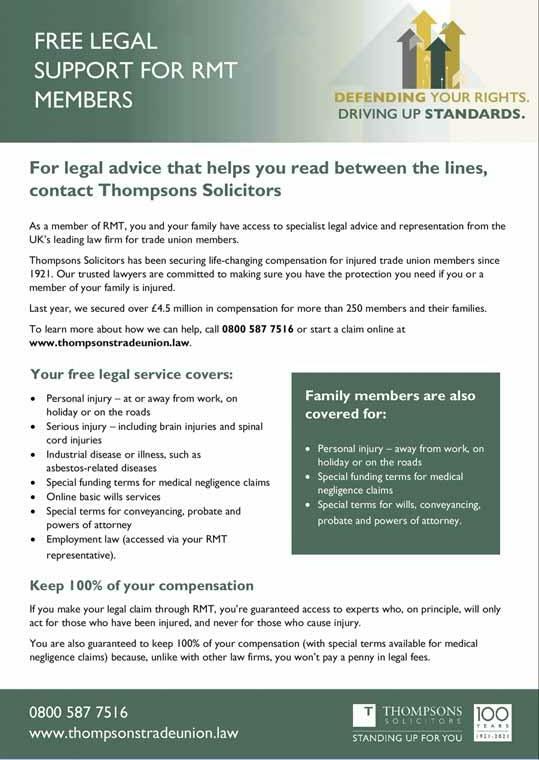

RMT In-house legal department successfully represented a member in a claim of suffering a trade union detriment and a detriment for making a protected disclosure against his employer London Underground Limited.
The member is employed as an Advanced Train Maintainer and has worked for LUL since 2003. He is an elected RMT health and safety representative and has also previously held the position of Industrial Relations rep.
During April 2019 the member raised health and safety concerns about track work with contractors including their scope of work, whether the track was safely secured and sought clarification in relation to their certification. In early May 2019 the member was sent an email to LUL informing them about various health and safety concerns including that uncertified contractors were being allowed to work on the track.
Later that month the member was approached by some of the members he represents about protection arrangements when carrying out ETR damage inspections. Our member subsequently, as
the RMT health and safety representative, raised concerns with management on behalf of his members including about the working arrangements and protection requirements when working on the track which he said were in breach of the Respondent’s agreed health and safety procedures.
He subsequently discussed the issue of protection with the Team Leader who became angry and aggressive with him and was abusive about other trade union representatives.
Our member then attended at the employer’s head office for a Tier 2 Health and Safety meeting. The health and safety issues raised by the member at Tier 1 concerning uncertified contractors and protection were registered as a failure to agree and had been escalated on to the agenda for Tier 2 Health and Safety meeting.
Prior to the meeting he was called into an office by his manager and suspended on full pay. The suspension letter stated his suspension was based on two allegations concerning his conduct when it was alleged that he was aggressive and shouted at colleagues.
Prior to the start of the Tier 2 meeting the chair informed
those present that the member had been suspended. The Tier 2 meeting proceeded in the member’s absence and the two items he had placed on the agenda, which had been escalated from Tier 1, concerning working on track, uncertified contractors and protection requirements these health and safety concerns were withdrawn.
Our member attended a fact-finding meeting in June 2019. On 14 August 2019 the member was informed by his RMT regional organiser that the company had advised there was no case to answer.
RMT claims for Trade Union Detriment and detriment for making a Protected Disclosure were brought at the Watford Employment Tribunal in April 2022. The member was represented by Counsel from Doughty Street Chambers at his hearing which lasted for four days. By reserved Judgment the Tribunal found the claimant’s claims for detriment relating to his suspension contrary to both section 146 TULR (trade union activities) and section 47B ERA (protected disclosures) were well founded and successful.
Although the Tribunal had listed a Remedy Hearing to be heard in October, the claim
settled beforehand without the need for the Remedy Hearing to proceed.
This case shows that RMT will take every reasonable step including legal action to protect our members and lay representatives from being victimised for their trade union activities and/or where they blow the whistle on their employer’s unsafe working practices.
RMT assistant general secretary John Leach, at the time the London Transport regional organiser, said that this case of victimisation of a RMT HS rep was blatant.
“Here was a highly motivated and effective HS rep and management manipulated a means to try and to sack and by means of suspension removed him from representing his members health and safety. “LUL lost morally and now legally and it needs to take a good hard look at itself and learn.
“His workmates, RMT branch and other RMT reps were fantastic, as was the top class legal representation. This solidarity is precious and defines our union’s determination to protect our reps and members in the crucial area of health and safety,” he said.
Case shows that RMT will take every step to protect members from being victimised for
RMT Cambrian branch held a long-service awards night and honoured retiring branch secretary Colin Rigby at a branch meeting in Machynlleth recently. RMT National Executive Committee member Steve Shaw reported on latest developments in RMT pay negotiations with Transport for Wales and on the national rail dispute with Network Rail and the TOCs.
RMT President Alex Gordon presented long-service awards to branch members Phil Scott








(pictured) a Train Driver and Gareth Charlton (pictured) a Guard for TfW. Alex also presented branch secretary, Colin Rigby with an RMT tankard and congratulated him on his tremendous work in rebuilding RMT Cambrian branch over 10 years. The whole branch wished Colin a long and happy retirement with his partner Lorraine. Their son Ben carries on the family tradition as a leading RMT activist in the branch.
London Underground Fleet Branch celebrated its 2022 Awards evening in November at the Sir Christopher Hatton pub in Holborn. RMT general secretary Mick Lynch presented 25 and 40 year badges to long-serving RMT members as well as one special award, which was given for the first time for several years.
It is customary for the President to use this month’s column to wish all RMT members and their families a happy and a prosperous New Year.
Prosperity might seem a fantasy right now for families struggling to cope with double digit inflation, skyrocketing price increases in basic food staples such as milk, bread and pasta and cost hikes in everything from energy to housing under the government of billionaire, Rishi Sunak.
However, the reality is that in 2023 we are in a stronger position to win justice for working people than for many years.
2022 was a momentous year for our union and for the working class in Britain. It was a year when workers united and fought back against pay cuts, and attacks on jobs and conditions from the Royal Mail to Liverpool and Felixstowe Docks, to University Lecturers and even Old Bailey Criminal Defence Barristers.
RMT members’ extraordinary unity throughout December 2022 and January 2023 taking strike action and refusing to work overtime demonstrated our determination and collective discipline to stand up to rail bosses, Government ministers and their lackeys in the media. Despite the most deceitful, biased, anti-
worker press coverage since the 1984 Miners’ Strike, they couldn’t land a glove on our General Secretary, Mick Lynch. He floats like a butterfly, stings like a B-52 bomber.
Across Network Rail and fourteen Train Operating Companies, RMT members voted by margins of nine to one to renew our mandate for industrial action in the National Rail Dispute for another six months.

Across nine separate railway cleaning contractors, RMT members voted massively for strike action in their fight for £15 an hour, free travel, and sick pay.
The truth is that in 2022 RMT members rediscovered our spirit of solidarity and solid discipline that makes employers respect and fear us.
We took some mighty blows including the sacking of 700 Seafarers via Zoom by P&O, but we also won real victories including RPI pay increases for some members employed by London Underground, MTR Elizabeth Line, Eurostar, Scotrail and Transport for Wales.
Our greatest achievement was to inspire the labour movement to get off its knees and fight back to bust the Tory pay freeze. We now have the formidable task of keeping our movement together and coordinating
national industrial disputes with other trade unions representing postal workers, nurses, ambulance drivers, driving instructors, border force staff and teachers to win a real jobs, pay and conditions offer that our members can vote on.
In this task we are only able to keep going forward because of the energy, determination, and loyalty of RMT members across all the transport industries. That loyalty rests on our members’ knowledge that their union represents them because we are democratic. We elect our leaders and hold their decisions up to scrutiny and account. It is why we have a lay member elected governing body, our National Executive Committee.
Dave Marshall’s Organising Unit workmates gave him a good send-off recently after Dave decided to retire from his job as a recruitment and retention organiser.
Dave started working for the union in 2008 having left the steel workers union where he was a regional organiser –specialising in winning recognition through the legislation/CAC process.
National Organising Coordinator Alan Pottage said:“Bob Crow was GS at the time, and he was delighted when Dave started working for us as Bob was already aware of Dave’s abilities.
“Dave’s abilities and expertise are now well known amongst many RMT activists.

His attention to detail was second to none and he was a gifted negotiator and organiser.
“I would especially like to highlight the efforts he made when he was given the task of helping organise our young member activists.
RMT’s young team could not have asked for a more dedicated and caring trainer to help tutor them over a six-year period. Many of those young activists are playing a vital role in our union today and when I meet them in my travels they often ask after Dave.
“I knew Dave when he worked for steel workers union and when we first met, we had a huge argument after a conference, but we kept
buying each other pints.
Another regional 0rganiser who witnessed this couldn’t believe we remained good friends, but it just shows that you should be able to have a heated debate without any stupid falling out.
“For the following twenty years we continued to
disagree on things but I’m still proud to call myself Dave’s friend.
“Dave will be missed by many activists who worked alongside him and then became good friends, but we all wish him well with his new adventures,” he said.






